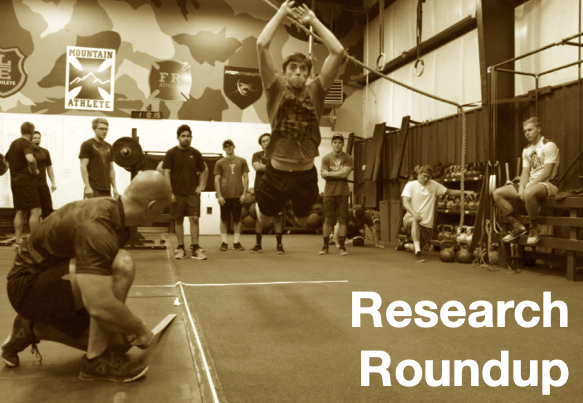
By Anna Woodring, MTI Strength and Conditioning Coach
BLUF:
The first study investigated how partial sleep deprivation affects moral reasoning and moral judgment in military officers. The study found that sleep deprivation significantly diminished the capacity for mature and principled moral reasoning in officers compared to when they were well-rested.
The second study focused on how body armor impacts dynamic postural stability during single-leg jump landings. The study found that the minimal load of body armor leads to a significant decrease in dynamic postural stability, which can potentially contribute to a rise in musculoskeletal injuries in the lower extremities.
The third study examined the associations between diet, physical performance, and selection at Army Special Forces Assessment and Selection. The study found that candidates with a higher diet quality had a higher chance of successful selection. Higher scores on physical performance markers were shown in candidates eating more vegetables, greens, beans, seafood, plant protein, and refined grains.
The Impact of Partial Sleep Deprivation on Moral Reasoning in Military Officers
This study published in the Sleep journal investigates how partial sleep deprivation affects moral reasoning and moral judgment in military officers. The study used 71 officer cadets from the Norwegian Naval Academy and the Norwegian Army Academy, tested under two conditions: rested and sleep deprived. The cadets were assessed using the defining issues test, which has them rank the importance of different circumstances presented to measure their ability to make moral judgment calls for each situation. The sleep-deprived condition had an average of 2.5 hours per day for 5 days. The rested condition received 8 hours per day.
Results
The findings showed that partial sleep deprivation significantly diminished the capacity for mature and principled moral reasoning in officers compared to when they were well-rested. The officers shifted towards a more rules-oriented approach under sleep-deprived conditions. Officers who initially demonstrated high levels of mature moral reasoning while rested experienced a substantial decline in this capacity during sleep deprivation, opting instead for a pronounced increase in rules-oriented moral reasoning and a focus on self-interest. Officers with low levels of mature moral reasoning in the rested condition were unaffected by sleep deprivation.
Takeaway
This study shows that decision-making involving moral judgments is significantly decreased while sleep deprived. Cadets were used for testing, which is a limitation as many have not fully matured or been trained on how to make moral decisions while experiencing stress or sleep deprivation. Sleep deprivation could lead to a “group thinking” mentality rather than using critical thinking skills. It is important to develop decision-making abilities that accompany continuous training.
The Addition of Body Armor Diminishes Dynamic Postural Stability in Military Soldiers
Postural instability has been recognized as a contributing factor to musculoskeletal injuries in the lower extremities. This study published in the Journal of Military Medicine investigates how body armor impacts dynamic postural stability during single-leg jump landings. Thirty-six soldiers from the 101st Airborne Division performed single-leg jump landings in the forward direction both with and without wearing body armor. Researchers utilized a force plate to calculate the dynamic postural stability. Soldiers were instructed to use a two-foot hop over a hurdle, land on one leg, and hold for 10 seconds.
Results
The minimal load of body armor leads to a significant decrease in dynamic postural stability, as indicated by higher values of medial, vertical, and anterior-posterior instability in the knee and ankle. This alteration in dynamic postural stability can potentially contribute to a rise in musculoskeletal injuries in the lower extremities.
Takeaway
The researchers tested how the minimum load a soldier carries impacts dynamic postural stability, which can lead to knee and ankle injuries. Using only body armor to test is unrealistic. Typically at a minimum, a soldier will also have on their body ammo and a day pack. To help prevent injuries, it is recommended to incorporate a realistic load with dynamic movements in a training schedule. Developing durable ankles and knees will improve postural instability, which will lead to fewer injuries in the long run.
Diet Quality Is Associated with Physical Performance and Special Forces Selection
This study published in the journal of Medicine and Science in Sport and Exercise examines the associations between diet, physical performance, and selection at Army Special Forces Assessment and Selection. The study recruited 782 soldiers attending assessment and selection from 12 courses. A questionnaire was used to track the types and amounts of food that each candidate was digesting throughout the course. The researchers also used an in-depth questionnaire to evaluate each candidate’s diet quality before assessment and selection.
Results
The candidates that already had a base knowledge and a higher diet quality had a higher chance of successful selection. An increase in sodium was shown at selection when compared to the diet prior to attending. Higher scores on physical performance markers such as road march times were shown in candidates eating more vegetables, greens, beans, seafood, plant protein, and refined grains.
Takeaway
Prior to attending any assessment and selection, it is important to focus on your diet. This will facilitate nutritional training needs, performance, and recovery leading up to attending selection. Not actively taking the time to dial in on nutrition will put your training at a disadvantage leading up to selection. It is important to find out what works best for your body and how to fuel for certain events at selection. Ensure that you understand the difference in event-specific performance nutrition and everyday nutrition.
